Introduction to Homer’s Odyssey (7 vols.)
Digital Logos Edition
Overview
Experience an ageless epic of Greek verse the way its original readers would have, with the Introduction to Homer’s Odyssey. This collection is perfect for both students and enthusiasts interested in reading this timeless treasure in the original Greek for the first time. In addition to the Loeb Classical Library editions of the Odyssey, this collection includes Leslie Edwards’ Reading Course in Homeric Greek—a comprehensive introduction to reading Homeric Greek, complete with large guided readings of the Odyssey designed to kick-start comprehension of the text. Rounding out the collection is George Autenreith’s Homeric Dictionary for Schools and Colleges, fine tuned for use alongside the Odyssey, featuring illustrations, references to Homer’s verse, and extensive lexicography.
One of the astonishing first fruits of Greek civilization, the Odyssey has determined much of the course of Western literary culture and imagination. Telling the long and painful story of Odysseus’ return from the Trojan War to his homeland of Ithaca and his wife Penelope, Homer eloquently comments on the mortality and morality of mankind. No literary or historical library is complete without the Odyssey. The themes and artistry of this epic poem resonates through thousands of years of mythology, philosophy, drama, poetry, and prose.

- Equips classical enthusiasts to engage Homer in the original Greek
- Provides a contemporary Greek language textbook and basic lexicon designed for reading Homeric Greek
- Includes the Odyssey in the Loeb Classical Library edition
The Introduction Series equips beginners to engage the likes of Plato, Homer, and Virgil in the original Greek and Latin. Each collection contains authoritative editions of the original language manuscript with an English translation, and a contemporary Greek/Latin language textbook as well as a basic lexicon, selected to fit the text at hand. It has never been easier for lovers of the classics to study these texts in their original language. Start using Logos, and discover the classics with the eyes of an expert.
- Title: Introduction to Homer’s Odyssey
- Volumes: 7
- Pages: 1,859
- Resource Type: Ancient Texts
- Topic: Homer
- A Reading Course in Homeric Greek, Book 1 by Leslie Edwards
- A Reading Course in Homeric Greek, Book 2 by Leslie Edwards
- Odyssey, vol. 1 translated by A.T. Murray
- Odyssey, vol. 1: Greek Text by Homer
- Odyssey, vol. 2 translated by A.T. Murray
- Odyssey, vol. 2: Greek Text by Homer
- A Homeric Dictionary for Schools and Colleges by Georg Autenrieth and Isaac Flagg
This title is included in the following collections
You can save when you purchase this product as part of a collection.
Greek Classics Research Librar...
$599.99$599.99
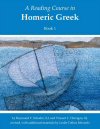
A Reading Course in Homeric Greek, Book 1
- Author: Leslie Edwards
- Edition: 3rd Revised
- Publisher: Focus Publishing
- Publication Date: 2004
- Pages: 448
A Reading Course in Homeric Greek, Book 1, provides a comprehensive introduction to Homeric Greek with a focus on reading Homeric texts. This volume includes 120 lessons on the orthography, phonetics, morphology, and syntax of Homeric Greek. Readings from Homer begin after the first 10 lessons in the book for immediate application. Honor work, appendixes, and vocabularies are included, along with review exercises and answer keys for each chapter. This volume also includes an additional 60 supplemental Homeric readings for sustained immersion.
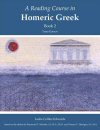
Reading Course in Homeric Greek, Book 2, presents Books 6 and 12 of the Odyssey in their entirety. Each lesson is a passage consisting of 10 to 25 lines of text. Each lesson also includes a memorization list of frequently found words, thematic commentary in shaded boxes, and expanded and revised grammatical notes. The text also includes a Greek-English vocabulary list, a summary of Homeric Greek grammar, and an appendix on reading Homer rhythmically.
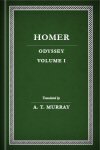
Odyssey, vol. 1
- Author: Homer
- Translator: A.T. Murray
- Series: Loeb Classical Library
- Publisher: Harvard University Press
- Publication Date: 1919
- Pages: 248
This volume contains A.T. Murray’s English translation of the first volume of Homer’s Odyssey.
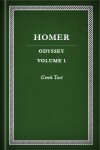
Odyssey, vol. 1: Greek Text
- Author: Homer
- Series: Loeb Classical Library
- Publisher: Harvard University Press
- Publication Date: 1919
- Pages: 248
This volume contains the Greek text of the first volume of Homer’s Odyssey.
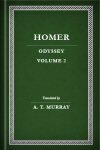
Odyssey, vol. 2
- Author: Homer
- Translator: A.T. Murray
- Series: Loeb Classical Library
- Publisher: Harvard University Press
- Publication Date: 1919
- Pages: 240
This volume contains A.T. Murray’s English translation of the second volume of Homer’s Odyssey.
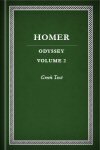
Odyssey, vol. 2: Greek Text
- Author: Homer
- Series: Loeb Classical Library
- Publisher: Harvard University Press
- Publication Date: 1919
- Pages: 240
This volume contains the Greek text of the second volume of Homer’s Odyssey.
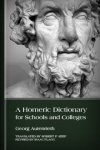
This standard Homeric Greek dictionary combines extensive lexicography with pictorial illustrations, providing scholars and students with strong, contextual impressions of this important dialect. Word entries list related nouns and verbs for conceptual coherence in vocabulary acquisition. Verb entries list tense and voice forms for easy reference. The dictionary also includes Homeric hapax legomena. This dictionary, optimized for use with Homeric Greek texts, references where words occur in the Iliad and Odyssey. Rather than being left to imagine a word’s referents and contexts, you’ll see 130 images providing visually and culturally rich illustrations of hundreds of words for maximum semantic content. This volume also offers a linguistic orientation to Homeric Greek with an overview of its unique features.
Isaac Flagg (1843–1931) was professor of Greek at Cornell University from 1871 to 1888 and professor of classical philology at the University of California, Berkeley, from 1891 to 1909, after which he was made professor emeritus.
Robert P. Keep (1844–1904) was an instructor at the Norwich Free Academy in Norwich Connecticut.
Homer (ca. 8th century BC) is the subject of intense debate regarding his life and origins. No solid biographical information exists for Homer, though legends abound. His name is related to a Greek word meaning “blind,” giving rise to the tradition of Homer as the blind bard. Many modern scholars dismiss the notion of Homer as a single author, arguing that the works attributed to him are based on many generations of oral story telling. When speaking of Homer, these scholars are referring to the date in which the works attributed to Homer were created. Some scholars suggest that Homer refers to the function of redacting oral tradition into a coherent whole.